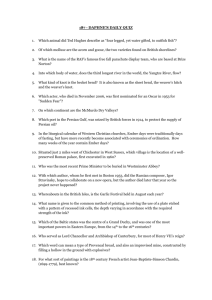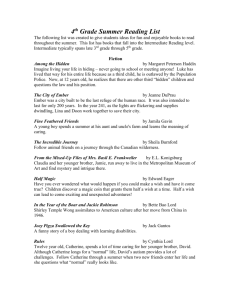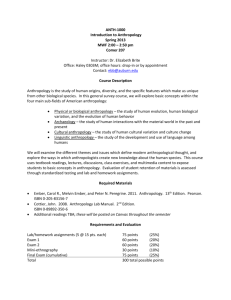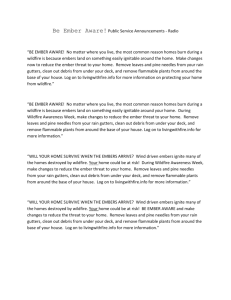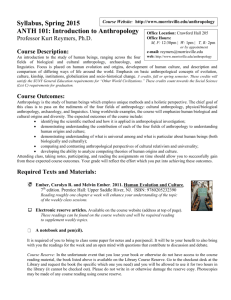Anthropology 220
advertisement
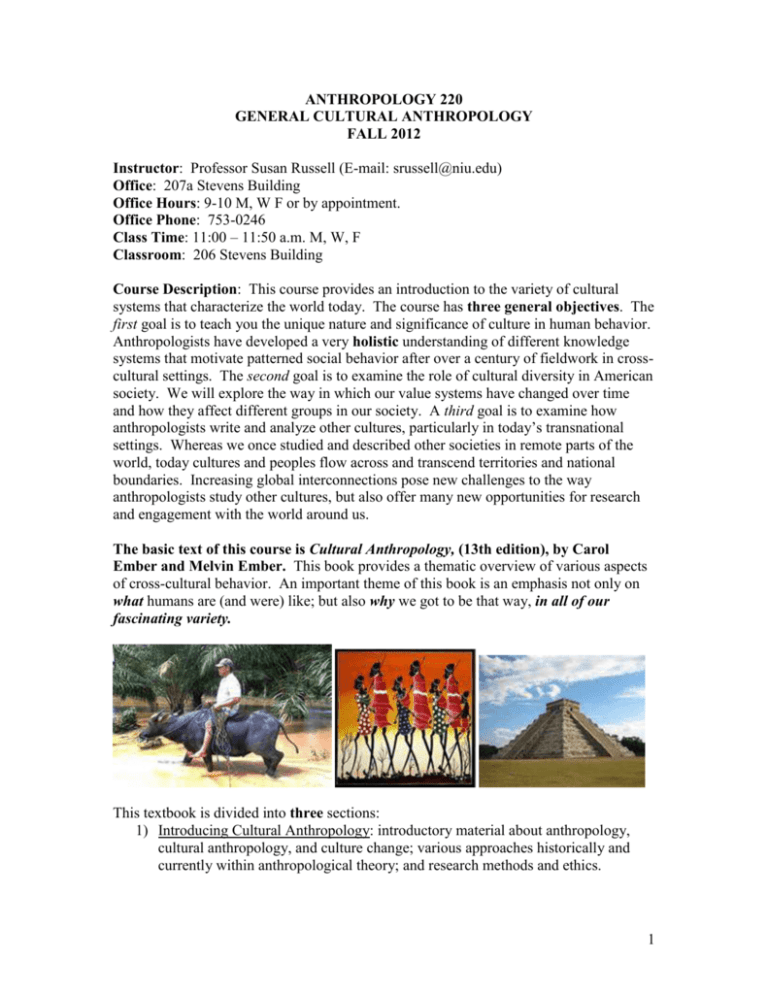
ANTHROPOLOGY 220
GENERAL CULTURAL ANTHROPOLOGY
FALL 2012
Instructor: Professor Susan Russell (E-mail: srussell@niu.edu)
Office: 207a Stevens Building
Office Hours: 9-10 M, W F or by appointment.
Office Phone: 753-0246
Class Time: 11:00 – 11:50 a.m. M, W, F
Classroom: 206 Stevens Building
Course Description: This course provides an introduction to the variety of cultural
systems that characterize the world today. The course has three general objectives. The
first goal is to teach you the unique nature and significance of culture in human behavior.
Anthropologists have developed a very holistic understanding of different knowledge
systems that motivate patterned social behavior after over a century of fieldwork in crosscultural settings. The second goal is to examine the role of cultural diversity in American
society. We will explore the way in which our value systems have changed over time
and how they affect different groups in our society. A third goal is to examine how
anthropologists write and analyze other cultures, particularly in today’s transnational
settings. Whereas we once studied and described other societies in remote parts of the
world, today cultures and peoples flow across and transcend territories and national
boundaries. Increasing global interconnections pose new challenges to the way
anthropologists study other cultures, but also offer many new opportunities for research
and engagement with the world around us.
The basic text of this course is Cultural Anthropology, (13th edition), by Carol
Ember and Melvin Ember. This book provides a thematic overview of various aspects
of cross-cultural behavior. An important theme of this book is an emphasis not only on
what humans are (and were) like; but also why we got to be that way, in all of our
fascinating variety.
This textbook is divided into three sections:
1) Introducing Cultural Anthropology: introductory material about anthropology,
cultural anthropology, and culture change; various approaches historically and
currently within anthropological theory; and research methods and ethics.
1
2) Cultural Variation: communication systems and languages; Getting food and
economic systems; social stratification (class, ethnicity and race); sex and gender;
kinship and marriage and family variations; associations and interest groups; and
political and religious mosaics.
3) Using Anthropology (or Applying Anthropology): applied practices and
problems addressed by anthropologists, medical anthropology, anthropology of
business; global problems.
The book is supported by a wealth of learning resources, articles, quizzes and other
monographs on the website MyAnthroLab (www.MyAnthoLab.org). You will need to
access this website to do the assigned readings and to help you prepare for examinations.
The main text book is on this Website as an e-book, with glossaries and power point
presentations of each chapter. A second, much shorter ethnography entitled Red Flags
and Lace Coiffes: Identity and Survival in a Breton Village, by Charles Menzies (2011) is
available in the bookstores or on Amazon.com; it is an in-depth examination of
contemporary struggles of fishers in France to maintain their way of life. Such struggles
depict many of the dilemmas peoples face in all walks of life and in all parts of the world.
A final reading assignment consists of one short (17 pages) article titled ‘Hunger and
Famine’, by Robert Dirks. It can be read or downloaded from MyAnthroLibrary (under
‘Resources’ on MyAnthroLab: www.myanthrolab.com ).
This short case study and the movie ‘Malawi’: a Nation Going Hungry’ will be the
focus of a reaction paper that is due early in the semester. As part of this integrated
assignment, students are asked to voluntarily ‘fast’ for most or all of one day to
experience some semblance of what hunger is and understand how many people in the
world go on about their daily activities with a shortage of food. Hunger is a world-wide
problem and prevalent in the U.S. as well as many other countries where there are large
gaps in income and opportunities for people.
The second reaction paper is due later in the semester and will focus on an individual
service learning requirement that involves a three hour volunteer activity at a charity or
non-governmental organization that seeks to improve the quality of life in your
community. You will need to provide authentication from the staff at the volunteer
organization in order to get credit for this assignment. You are also encouraged to go
with another member(s) of the class. The Salvation Army and Feed ‘Em Soup are both
eligible organizations here in DeKalb. The purpose is to enable you to reflect on how
associations and voluntary organizations operate to enable social networking for
2
segments of a population in need, as well as the importance of citizens contributing to the
social capital of a community.
The goals of this course will be accomplished through class readings, discussions,
lectures, writing assignments, student interviews and films. Members of the Themed
Learning Community entitled ‘Engage Now: The World is Our Community’ are also
expected to participate in a field trip to one of the oldest faith-based homeless shelters in
Chicago (Pacific Gardens Mission) and to a food distribution center operated by the state
of Illinois. This trip is tentatively scheduled for October 22; a bus will be provided.
A ‘critical thinking approach’ is important to achieve the learning outcomes of this
course. This approach prompts students to question what they are reading and what they
think they already know about a particular issue. Instead of simply accepting what we
read or hear and holding on to our current understandings, a critical thinking approach
demands that you ask questions in order to actively learn and engage with the content.
The basic questions of such an approach minimally are as follows (and which you should
memorize):
1. What is being said? In other words, what is the argument being put forward?
You should be able to summarize it in a few words.
2. Who is conveying this message in terms of their cultural context and theoretical
position, if knowable?
3. When was it written? Does the fact that this message is from a particular historic
era compared to contemporary times affect its content?
4. Why is the message being conveyed? What would someone choose to convey a
particular message? What might be the interests behind the message?
5. What is the evidence? What kinds of data are used and are they adequate?
6. Is the argument sound? On the basis of addressing these questions above, you
should be in a better position to accept or reject a claim or argument.
7. What is missing? What questions go unasked, and what gaps exist for future
research and thinking?
Themed Learning Community (TLC) Policy
This course is part of a Themed Learning Community, meaning it is intentionally paired
with one or two other courses taken in conjunction with one another. It is required that
you are enrolled in ALL TLC courses simultaneously in order to benefit from the unique
learning opportunity created by these bundled courses. If, for some reason, you wish to
drop one of your TLC courses, you must drop all of the courses that make up this TLC.
Students are responsible for seeking additional guidance from their TLC instructors or the
Office of Student Engagement and Experiential Learning (OSEEL) regarding possible
withdrawal from TLC courses. Along with the benefits of integrative coursework, TLC
students will also benefit from additional mentoring, academic support, and additional
co-curricular opportunities. These opportunities and expectations will be announced in
class and on the TLC segment of Blackboard.
3
Course Requirements: Your final grade will be determined in the following way:
Note: you must complete all assignments to pass this course. This point is repeated
below; there are no appeals.
Activity:
Percentage points
Class Participation/Attendance
Reflective Paper on Hunger
Midterm Exam 1
Kinship study & paper
Volunteer Activity (3 hours)
Reflective Paper on Volunteerism
Final Exam
5 percent (daily)
20 percent (Sept.21)
25 percent (Oct. 17)
10 percent (Oct.31)
5 percent (by Nov.26)
10 percent (Nov.30)
25 percent (Dec.12, 10-11:50 a.m.)
TOTAL
100 PERCENT
Exams: will be a combination of short answer and multiple choice questions. I
distribute review sheets before each exam to help you prepare. Please note that you will
not be able to take an early exam or an incomplete in the course. Failure to complete
any course requirement will result in failure of the course. The only exceptions are
illness (which will require a signed doctor’s excuse) or a death in the immediate family.
Also, anyone arriving over ten minutes late for an examination may not take the exam.
We will stick as closely as possible to the schedule contained in this syllabus; however, if
we fall behind we will make slight adjustments to the dates of the exams. You are
responsible for doing the assignments and assigned readings each week in order to
participate in class discussions effectively. Midterm exam is October 17; Final exam
is December 12.
Class participation/attendance: this part of your grade will be based on your
attendance record and your participation in discussions and in-class projects or quizzes
that are assigned. You will need to do the readings each week in order to earn an A for
class participation. You can prepare for occasional quizzes by studying the chapter-bychapter practice tests in MyAnthroLab. Also, attendance will be taken daily. A failure to
attend 4 class sessions will result in a reduction of one letter grade for this part of your
grade.
Reflective Paper on Hunger: you will write a 3-4 page typed, double-spaced (1 inch
margins) reaction paper to the film “Malawi: a Nation Going Hungry” and the short
article ‘Hunger and Famine’, by Robert Dirks, which can be downloaded from
MyAnthoLibrary under ‘Resources’ on the website for the textbook. You are also
encouraged to fast for most or all of one day as part of this assignment. Consult the
following guidelines for your paper: http://leo.stcloudstate.edu/acadwrite/reaction.html.
Paper is due on Sept. 21.
Kinship Study & Paper Assignment: you will each conduct a 1 – 1 ½ hour interview
with another student in class in order to write a description of this student’s kinship and
4
family structure, based on questions you derive from Ch. 6 of the main textbook. The
description, interpretation and your reflection on the benefits or challenges of applying
what you have learned so far in the course as it relates to this assignment should be 3-4
typed, double spaced pages. This assignment is due on Oct. 31.
Volunteer Activity: you will participate in 3 hours of volunteering at one of the nongovernmental organizations in DeKalb or Sycamore, such as The Salvation Army or Feed
‘Em Soup. An alternative organization can be proposed, but all volunteer activity must
be acknowledged by a signed staff member of the organization and presented in
written form (with a phone number for verification) to the instructor of the course
NO Later than Nov. 26.
Reflective Paper on Volunteerism: you will write a 2-3 page typed, double-spaced (1
inch margins) reaction paper to your service learning activity and reflect on what
volunteering means in the overall quality of life in a community. How does volunteering
make you feel in terms of your connections to your community? How could life be better
if everyone volunteered? This paper requires you to complete your 3 hour volunteer
activity before writing it.
Consult the following guidelines for your paper:
http://leo.stcloudstate.edu/acadwrite/reaction.html. Paper is due on Nov. 30.
Cheating and Plagiarism Policy: No summarizing of published work without a full
citation of sources (including Internet sites) is allowed. Failure to follow this rule will
result in failure of the course.
Note: NIU abides by Section 504 of the Rehabilitation Act of 1973 which mandates
reasonable accommodations be provided for qualified students with disabilities. If you
5
have a disability and may require some type of instructional and/or examination
accommodation, please contact me early in the semester so that I can provide or facilitate
in providing accommodations you may need. If you have not already done so, you will
need to register with the Center for Access-Ability Resources (CAAR), the designated
office on campus to provide services and administer exams with accommodations for
students with disabilities. The CAAR office is located on the 4th floor of the University
Health Services building (815-753-1303).
The final exam is scheduled for Wed., December 12, 10-11:50 a.m.
Week Of:
ASSIGNED READING
Aug.27
Part One: Introducing anthropology.
Ch. 1 of Ember & Ember’s text, Cultural Anthropology [What Is
Anthropology?]
Sept.3
NO CLASS ON SEPT. 3 – LABOR DAY HOLIDAY
Ch. 2 & 3 of Ember & Ember’s text, Cultural Anthropology
{Culture and Culture Change; History of Theory in Anthropology]
Sept.10
Part Two. Cultural Variation
Ch.. 4 & 5 of Ember & Ember’s text, Cultural Anthropology
[Explanation & Evidence; Communication & Language]
Sept.17
Ch.6 of Ember & Ember’s text [Getting Food]
Article – ‘Hunger and Famine’ by Robert Dirks (on
MyAnthroLibrary)
Reflective paper on hunger due on Sept.21
Sept.24
Ch. 7 of Ember & Ember’s text [Economic Systems]
Oct.1
Ch. 8 of Ember & Ember’s text [Social Stratification: Class,
Ethnicity, and Racism]
Oct.8
Ch. 9 & 10 of Ember & Ember’s text [Culture and the Individual;
Sex, Gender, and Culture]
Oct.15
Review for Exam
Midterm Exam on Oct. 17
Begin reading Red Flags and Lace Coiffes
Oct. 22
Ch. 11 & 12 of Ember & Ember’s text [Marriage and the family;
Marital Residence and Kinship]
Continue reading Red Flags and Lace Coiffes
6
Oct. 29
Ch. 13 of Ember & Ember’s text [Associations and Interest
Groups]
Kinship study of a classmate based on an interview is due on
Oct. 31
Nov.5
In-Class Discussion of Red Flags and Lace Coiffes (bring
written questions and comments to class on Nov. 5)
Ch. 14 of Ember & Ember’s text [Political Life: Social Order and
Disorder]
Nov.12
Ch. 15 of Ember & Ember’s text [Religion and Magic]
Nov.19
NO CLASS NOV.21 OR 23 – THANKSGIVING BREAK
(Complete volunteer activity and read Ch. 16 of Ember &
Ember’s text -- The Arts)
Nov.26
Turn in written verification of volunteer activity
Reflective paper on volunteerism due on Nov.30
Part III. Using Anthropology
Ch. 17 of Ember & Ember’s text [Applied, Practicing, and Medical
Anthropology]
Dec.3
Ch. 18 of Ember & Ember’s text [Global Problems]
Review for Final Exam
FINAL EXAM ON WEDNESDAY, DECEMBER 12, 10-11:50 A.M.
HAVE A GREAT WINTER BREAK!
7
